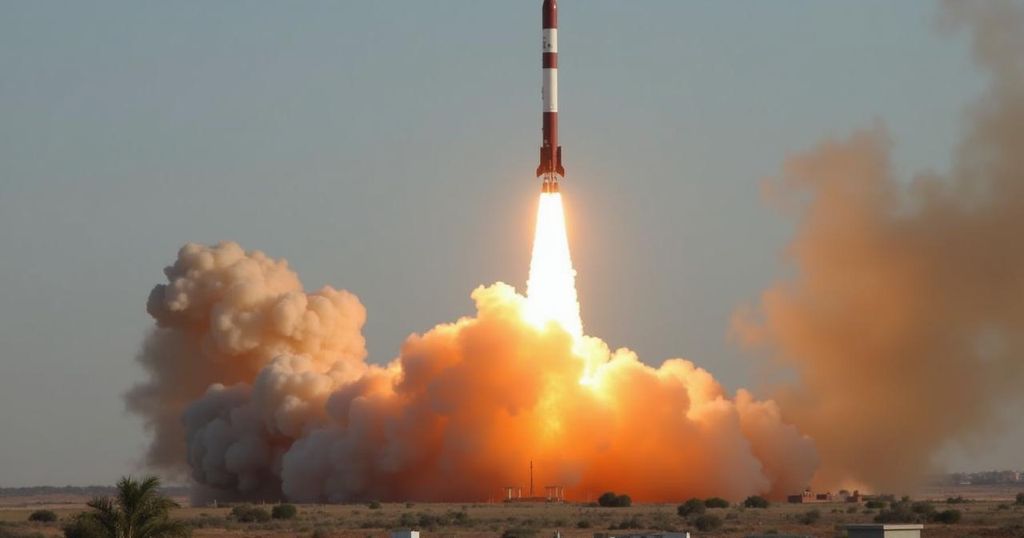Iran is notably anxious regarding the anticipated Israeli response to a recent missile attack, prompting urgent diplomatic discussions with Arab nations. There are concerns over Israel potentially targeting Iran’s nuclear sites and oil facilities, which may lead to wider regional conflicts. The United States is involved in advising Israel to maintain proportionality in any retaliation, while Gulf allies stress the importance of avoiding further escalations within the region.
The Iranian government is reportedly experiencing significant anxiety as it anticipates Israel’s response to a missile attack carried out earlier this month. In an effort to mitigate the potential for a substantial retaliatory strike, Iran has been actively engaged in diplomatic outreach with neighboring countries. Iranian officials are particularly concerned about the influence of the United States over Israel’s military actions, specifically regarding the possibility of Israel targeting Iranian nuclear facilities or oil installations. This anxiety is compounded by the diminished state of Hezbollah, Iran’s primary proxy in the region, which has suffered considerable losses in recent Israeli military operations. The Biden administration has been closely consulting with Israel regarding its response strategies, emphasizing the need for any retaliation to be proportional in nature. President Biden has recently communicated with Israeli Prime Minister Benjamin Netanyahu for the first time in almost two months, reiterating a cautious approach. Gulf allies, including the United Arab Emirates, Bahrain, and Qatar, have raised concerns with the United States about the ramifications of a potential Israeli attack on Iranian oil facilities, fearing both economic and environmental consequences for the region. The ongoing exchanges of hostilities between Iran and Israel raise alarm within the Biden administration, which fears that such escalations could draw the United States into a broader conflict. The relationship between the United States and Israel appears to be fraying, as evidenced by Israel’s recent military activities in Lebanon and its failure to consult with the United States prior to significant operations. An Israeli official indicated that no decisions have yet been made by the Israeli security cabinet regarding future military actions. Israel’s Defense Minister, Yoav Gallant, issued a stern warning to Iran, declaring, “Our strike will be powerful, precise, and above all – surprising. They will not understand what happened and how it happened.” While Gulf states predominantly wish to remain neutral in the conflict, they have assured both the United States and Iran that their airspaces would not be utilized for any Israeli strikes against Iran. Additionally, Jordan has pledged to prevent unauthorized incursions into its airspace, irrespective of their origin. Despite public assertions from Iranian officials that they do not seek full-scale war, the exact nature of their response to potential Israeli military actions remains uncertain. The United States is engaging in discreet communication with Iran, advocating for restraint yet expressing trepidation over the unpredictable dynamics at play. Meanwhile, diplomatic discussions between Iran and Saudi Arabia are reportedly ongoing, as Iran seeks assistance in navigating the escalating tensions with Israel.
The recent geopolitical developments in the Middle East have intensified tensions, particularly following Iran’s missile attacks on Israel. The necessity for diplomatic dialogue has become paramount as regional players, including the United States, work to manage the escalating situation. Israel’s aggressive military posture toward Iran’s nuclear capabilities has historically heightened fears of regional instability, creating complex security challenges in the area. Given the involvement of proxy forces and the strategic interests of neighboring countries, the potential for conflict is both imminent and precarious.
In summary, Iran is on high alert as it awaits Israel’s response to its missile strikes, leading to heightened diplomatic efforts to avert a military escalation. The United States is actively engaged in consultations with Israel and regional allies to promote restraint and prevent a broader conflict. The situation remains fluid, with potential ramifications for regional stability and international relations. The forthcoming responses from both Iran and Israel will be critical in defining the trajectory of this ongoing crisis.
Original Source: www.cnn.com






